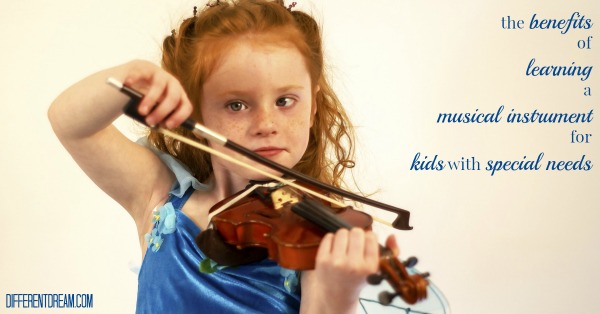Five Reasons Music Helps Children with Special Needs

Music helps children with special needs in many ways. Guest blogger Sally Keys explains five of them in this post.
5 Reasons Music Helps Children with Special Needs
Educators the world over are exploring how to use music to help children with special needs. These needs run the gamut from autism spectrum disorders (ASD) to physical disabilities and learning difficulties. Here are 5 reasons learning a musical instrument can help children.
- Motivation. Those of us who struggle to learn find more motivation in music than other forms of learning, but making sounds and singing songs works for a lot of students.
- Multi-Sensory Experience. Many students with special needs enjoy learning through sounds, through tactile experiences, through movement, and visually. Playing an instrument activates all of these areas.
- Music Works on the Left and Right Hemispheres. Our brains process music in several different areas, similar to a multi-sensory experience. Children whose brains work differently can enjoy many kinds of experiences from the music.
- Music is Nonverbal. Many children with unique needs struggle to verbalize their feelings and knowledge. Music moves beyond words and transcends the need for verbal communication. Think of how many people connect through music when they cannot speak the same language.
- Music Creates Bonds. Finally, music is a great way to help bring people together. Listening and playing music together creates a wonderful bond between people.
Music and Intelligence
Decades of research have shown that learning a musical instrument can improve intelligence. Studies have shown that developing brains exposed to this kind of learning are able to distinguish and pick up different types of sounds which can later help the brain improve literacy. Picking up and remembering musical elements is also linked with improving both short term and long term memory, which has proven useful across the field from history to math.
Playing a musical instrument is not the only way in which music can influence a child’s academic ability. If a compilation of music tastes and SAT scores is to be believed, a favorite artist or genre can influence test results. For example, fans of Beethoven average 1371 while fans of Lil Wayne only average 889. The difference is stark and average test ranges for different genres show some out performing others.
Neuroscientists are currently examining the impact of classical music on creativity based on accounts about how music inspired Albert Einstein to make some of his discoveries. Let’s not forget that Einstein is believed to have been on the autism spectrum!
Do you like what you see at DifferentDream.com? You can receive more great content by subscribing to the quarterly Different Dream newsletter and signing up for the daily RSS feed delivered to your email inbox. You can sign up for the first in the pop up box and the second at the bottom of this page.
By Sally Keys
Sally Keys is a professional freelance writer with many years experience across many different areas. She moved from a corporate job to freelancing and loves the work-life balance it offers. When not at work, Sally enjoys reading, hiking, spending time with her family, and traveling.
Subscribe for Updates from Jolene
Related Posts
Middle-Grade Fiction about Kids with Special Needs
Guest blogger Lisa Pelissier introduces and explains her latest middle-grade fiction for kids with special needs.
God’s Power Is More than Sufficient to Answer our Prayers
Guest blogger Mark Arnold demonstrates that God’s power is more than sufficient to answer our prayers for our kids.
Emotions Are Information: A New Way to View and Interpret Big Feelings
Jolene explains the revelation she had about interpreting feelings as a special needs parent: emotions are information.






0 Comments